- OT
- Life in practice
- Career development
- Say yes
The cover story
Say yes
OT explores the doors that open when optometrists step outside of their comfort zone

10 February 2024
At the heart of Rukaiya Anwar’s career is a leap of faith. It has seen her speak in rooms where few people look like her, ask questions that few have considered and approach problems that seem insurmountable with an attitude of calm perseverance.
“I’m definitely a ‘say yes’ person,” Anwar told OT.
“You can make an impact in more ways than one as an optometrist,” she added.
This willingness to venture into unfamiliar territory can be seen more generally within the number of optometrists who are undertaking further qualifications.
A 2023 member survey by the AOP found that four in 10 optometrists planned to pursue an additional qualification such as independent prescribing (IP) or MECS-accreditation over the next two years.
Anwar shared that further learning both enhances her professional satisfaction and means she can provide better care for her patients.
“Since qualification, I’ve seen so much change – whether that's the way a sight test is done, or the equipment we have in practice, or new pathways that have been commissioned,” she said.
“It’s really important that we as practitioners, as clinicians and as leaders, also move forward with the change that we've got happening around us,” Anwar highlighted.
Anwar is an optometric adviser for Cardiff and Vale University Health Board and clinical lead for primary eyecare services. Alongside this work, she is completing a PhD with Anglia Ruskin University and works as a locum optometrist for specialist clinics.
For the past two years, Anwar has served as a council associate for the General Optical Council (GOC). The role was created in 2022 to provide optometrists and dispensing opticians with their first step towards a board, committee or panel role.

The role also addresses an imbalance between the background, experience and perspectives present within the profession as a whole, and those that are represented on council.
Around eight in 10 council and committee members at the GOC are white – compared to four in ten people within the professions they regulate.
Only 15% of council and committee members are under the age of 45, compared to 63% of optometrists and dispensing opticians.
Anwar shared that her motivation for applying to be a council associate was to gain experience in a governance role.
“As a council associate, you’re not necessarily making decisions, but you’re observing the way someone speaks or holds a conversation or feeds back,” she said.
“There’s an art etiquette that you learn in those meetings which can then be applied elsewhere,” Anwar shared.
Put yourself out there because you won’t know what your strengths are until you do
Alongside the daunting nature of stepping forward to speak alongside more senior colleagues, Anwar has had to overcome doubts about whether she will be understood when few people share the same experiences as her.
“When there’s no one who looks like you at the table, you get that feeling of imposter syndrome. I’ve definitely struggled with that before, where you think ‘Am I really the person who’s in charge? Why are they looking to me? Little, five foot one, me?’” she said.
Anwar believes that having a diverse range of perspectives can help with problem solving. For example, Anwar grew up translating letters that would come through the mail from English into Arabic for her grandmother.
As an optometric adviser, she recently contributed to a discussion about why translating leaflets into different languages had failed to result in an increase in people accessing healthcare services.
“It’s not necessarily because they can’t read the leaflet that’s printed in English. Sometimes there are so many other mental barriers and emotional barriers that you have to break down before the message reaches that group of people,” Anwar said.
“Unless we’ve got representation from those communities, at a board level, we’re not truly going to understand where we can implement feedback to improve services and accessibility,” she said.
In terms of her advice for other optometrists considering a leadership role, Anwar emphasised the importance of valuing the skills and experience they bring to the table.
“Lived experience is just as important as experience on a CV,” she said.
“I think my biggest top tip is to really put yourself out there, because you won’t know what your strengths are until you do,” Anwar emphasised.
Interested in becoming a council associate?
Bhakar shared that when he first started as a council associate, just putting his hand up to speak could be nerve wracking.
“You wonder whether your idea might be complete nonsense, or actually a unique perspective, which they wouldn't think about, because I’m at a completely different stage,” he said.
When considering which qualifications to undertake, Bhakar considers whether a course is applicable to his scope of practice and whether he will be able to use the skills he gains.
“Quite early on, I realised I didn’t want to sit in a test room for five days a week. I think it’s about what is going to spark your interest, and keep you enjoying what you do,” he said.
As someone at an early stage in his career, Bhakar wants to explore the different opportunities that optometry can offer.
“I want to gather a breadth of experience in optics in preparation for the future. The landscape in optics is changing and this is something I’ve seen first-hand within the GOC,” he said.
“Being a part of driving change requires a broad spectrum of experience as that shapes strategic thinking,” he added.
Bouncing back
In the heart of the pandemic, like so many optometry practice owners across the UK, Kaye Winship was approaching each challenge, day-by-day.
“I’d set myself a small goal and then I’d set myself bigger goals,” Winship explained.
“During COVID, it was: ‘Get through this day. Get through this week. Get through this month,” she said.
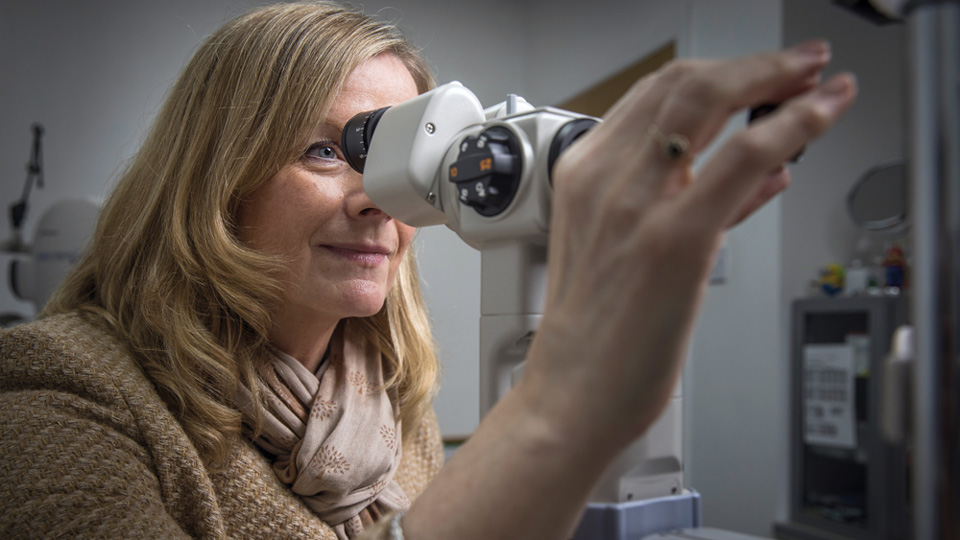
Three years after the global pandemic that brought many businesses to a standstill, Winship’s commitment to steering her 98-year-old practice through an unprecedented time has paid off.
She has invested in new equipment, overhauled her website and marketing strategy and added a second consulting room to the building which is used for contact lens clinics, podiatry and hearing care.
S Walton Eyecare has experienced growth of over 20% this year, with 1600 patients joining since April.
When asked how she has navigated challenges over 16 years of practice ownership – including two recessions – Winship emphasises the importance of an open mindset.
“An open mindset makes you embrace everything around you, every day – whether that’s looking at the birds in your garden or facing challenges at work,” she said.
“It’s the thought that you can achieve whatever you want to achieve by focusing in on a goal,” Winship added.
Winship’s determination to overcome the challenges that her practice faced during the pandemic has also extended to addressing inequalities that affect her local area.
Through her role on the Northumberland, Tyne and Wear local optical committee, Winship has helped to identify and tackle healthcare inequalities.
“I’ve seen optometry as a lifelong career and passion. And as a consequence, I’ve really tried to explore different aspects of the profession and keep my interest up throughout my career,” she said.
She assisted in spearheading the reinstatement of the South Tyneside Paediatric Service, which was paused during the pandemic.
Of the 316 local authorities in England, the area where Winship works – South Tyneside – is the 12th most income-deprived.
South Tyneside is ranked in the bottom 30% of local authorities when it comes to health outcomes.
And yet, when a patient presents at Winship’s practice with an urgent eye condition, there is no funding in place to provide treatment.
“It absolutely breaks my heart because MECS is commissioned in 75% of the country now but not in this area, where there is evidence that it is needed.” she shared.
“My aspiration is to have a minor eye conditions service commissioned in this area before I retire,” Winship said.
South Shields is one of many areas across the UK that could benefit under work that is currently being undertaken to develop a standard service specification for minor and urgent eye care in England.
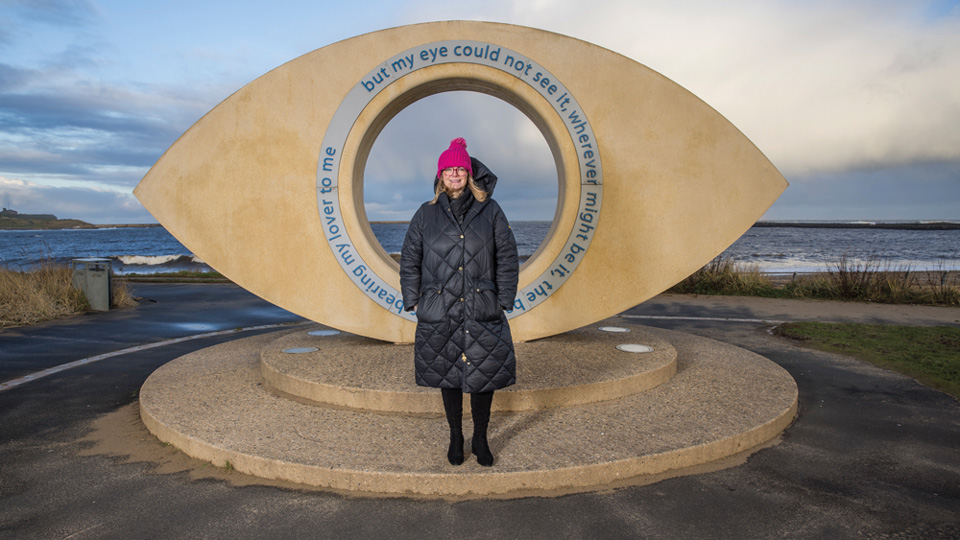
The specification, which is being developed by the Local Optical Committee Support Unit alongside the Clinical Council for Eye Health Commissioning, could help to reduce variation between the eye care services that people receive in different areas of England.
Winship describes herself as an “eternal optimist” when it comes to the future of the profession.
“Opportunities arise every day: what’s needed is the tenacity to recognise them and seize them. That’s what has kept me going,” she emphasised.
Sparking an interest
Mohammed Hafejee first started working in an optometry practice as a teenager at the weekend, before training as a dispensing optician.
He is now an optometrist with a long list of further qualifications to his name – and the owner of Airedale Opticians, with practices in Keighley and Cross Hills.
Hafejee shared that his experience in different roles within optics – including at one point glazing – has helped him as a manager.
“When you’ve spent time on shop floor for a few years, you appreciate all the different customers and patients who come in, and the demands of the job,” he said.
Although Hafejee has previously worked as a store manager for a multiple practice, he enjoys the freedom that running his own business offers.
He is able to tailor the care that he provides to the local population rather than following every memo sent from head office.
“You get to make the decisions, and those are the decisions you live by – so you try to make the right choices, but you also learn from your mistakes,” Hafejee shared.
Hafejee has completed further training in minor eye condition services, medical retina, and glaucoma. He is currently completing his independent prescribing qualification.
He views further education as a way of both providing better care for his patients and enriching his professional life.
Where some people might relax with their favourite box-set, Hafejee will spend his evenings studying a course or researching a question he would like the answer to.
“I’m a naturally curious person – I’m always wondering, ‘how is that? Why do we do that? How are you able to treat that?’” Hafejee shared.
The optometrist aims to pass on his passion for further learning to his staff – who have studied everything from paediatric care to social media.
“I will pay for any course that they want to do – whether that is related to optics or not,” Hafejee shared.
“You know that saying, ‘The mind isn’t a vessel but a fire to be lit?’ I want them to find their thing that ignites that spark,” he said.
On the frontline of the pandemic
One of Erica Campbell-Walker’s first memories is of an optometrist leaning toward her with an ophthalmoscope.
“I remember seeing what looked like cracked mud, and there was this little dip,” she recalled.
“I didn’t know it at the time but that was the macula,” Campbell-Walker shared.
Fast-forward to May 2020, and the optometrist and AOP Councillor was in a role about as far removed from that early experience of optometry as you could imagine.
As a clinical contact caseworker, Campbell-Walker would call people to ask for intricate and often intimate details of their lives in order to stem the spread of a global pandemic.
She would ask people who tested positive for COVID-19 where they had been, who they were with, and how close they were.
My career is a chocolate box of roles
Campbell-Walker was trained in memory and recall techniques to help people recollect details as specific as what number bus they had caught or the shops they visited on a morning of chores.
Although the conversations could often be uncomfortable, Campbell-Walker appreciated the gravity of the task.
“We were thinking that the information that we get from this could actually be saving lives,” she said.
In the next phase of the pandemic, Campbell-Walker was involved in the vaccine effort – delivering up to 100 vaccinations on a single day.
Over the course of 12-hour shifts, she calmed the anxious, fielded questions from the vaccine-hesitant and the team received gifts from people looking forward to being able to leave their house for the first time in months.
“I remember in the summer, someone got us ice creams,” she said.
During the course of her career as an optometrist, Campbell-Walker has worked as a practice director and locum optometrist.
After the pandemic, she returned to Oban to work for the optometrist who had first tested her eyes as a four year old – and prompted her interest in optometry – after learning that he was struggling to recruit.
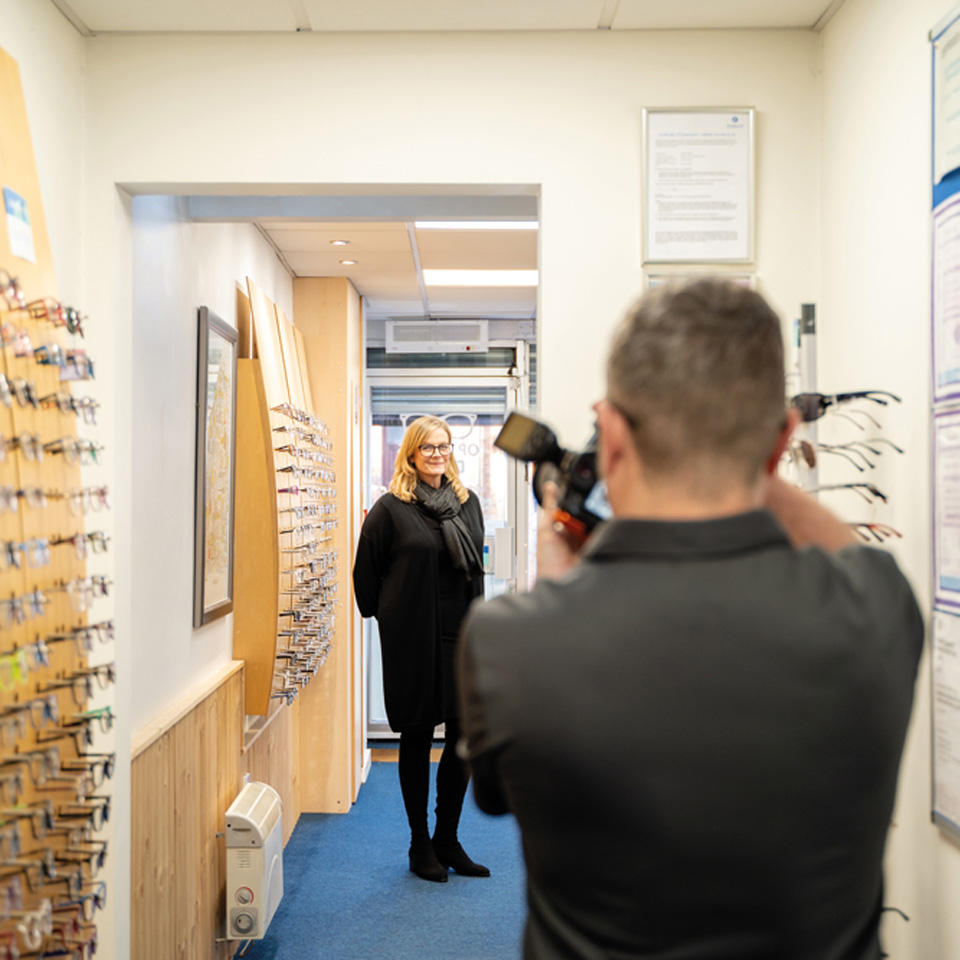
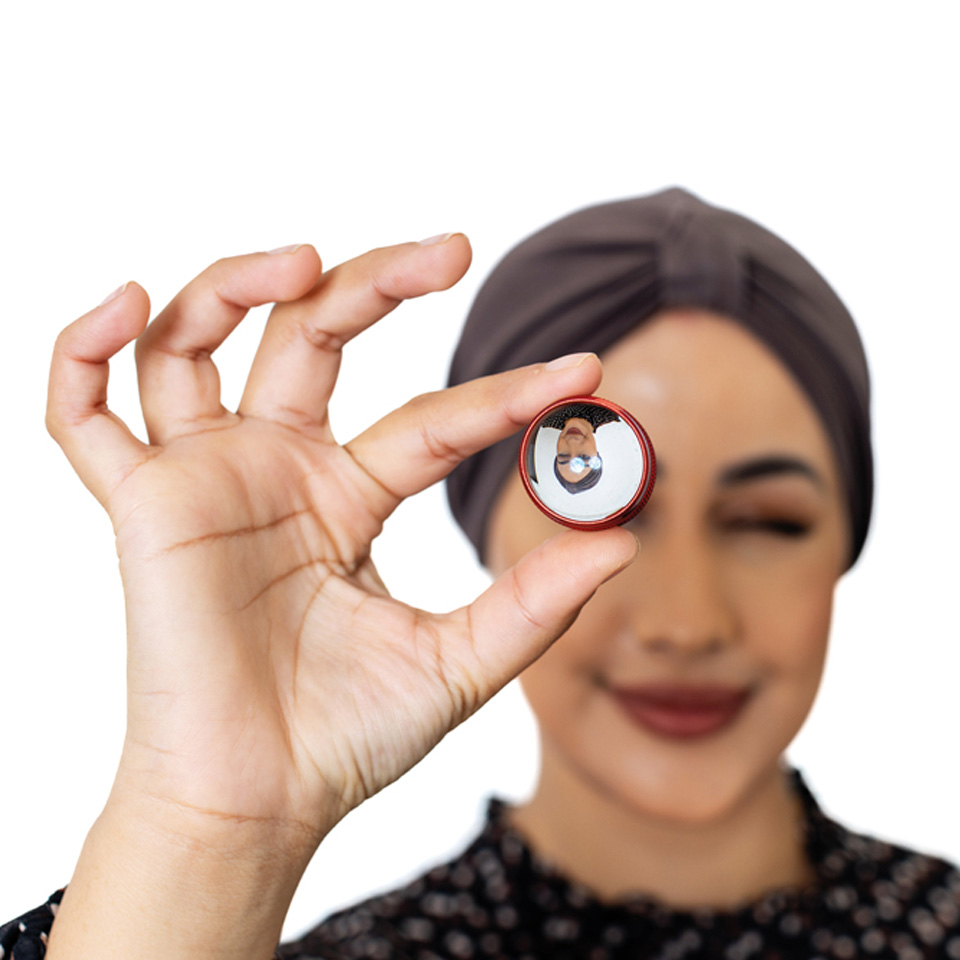
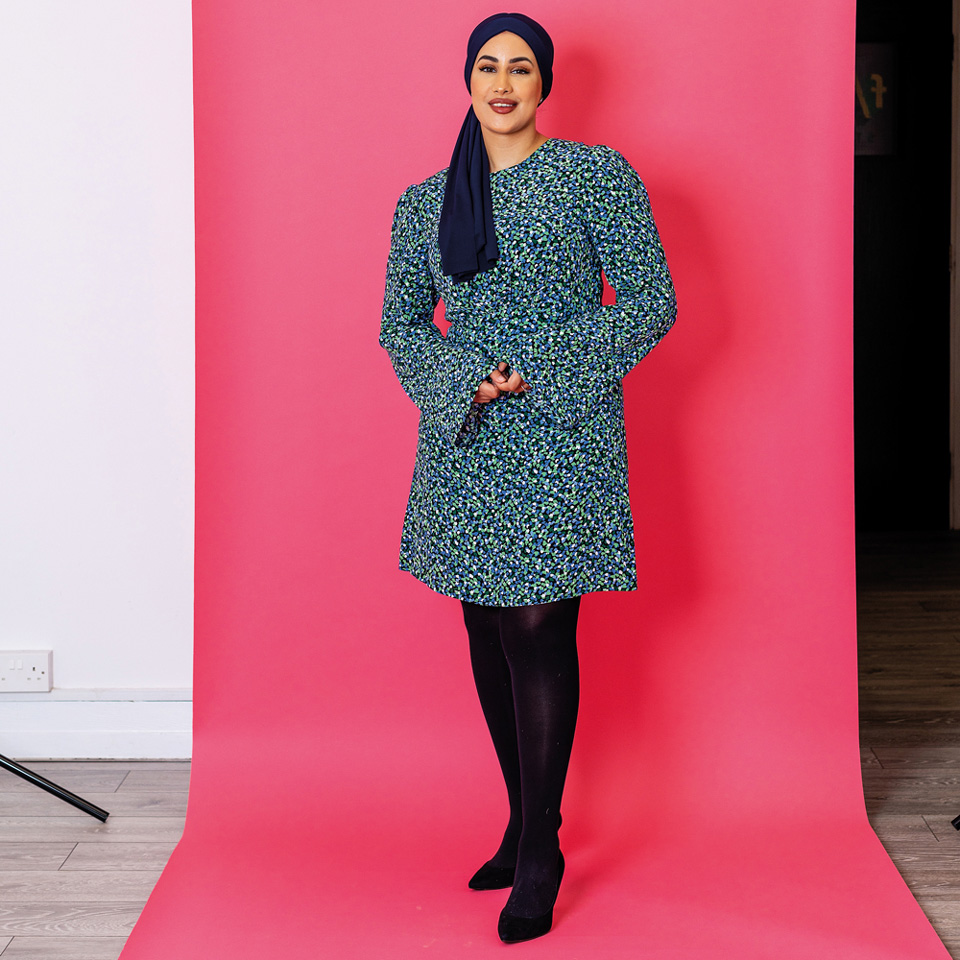
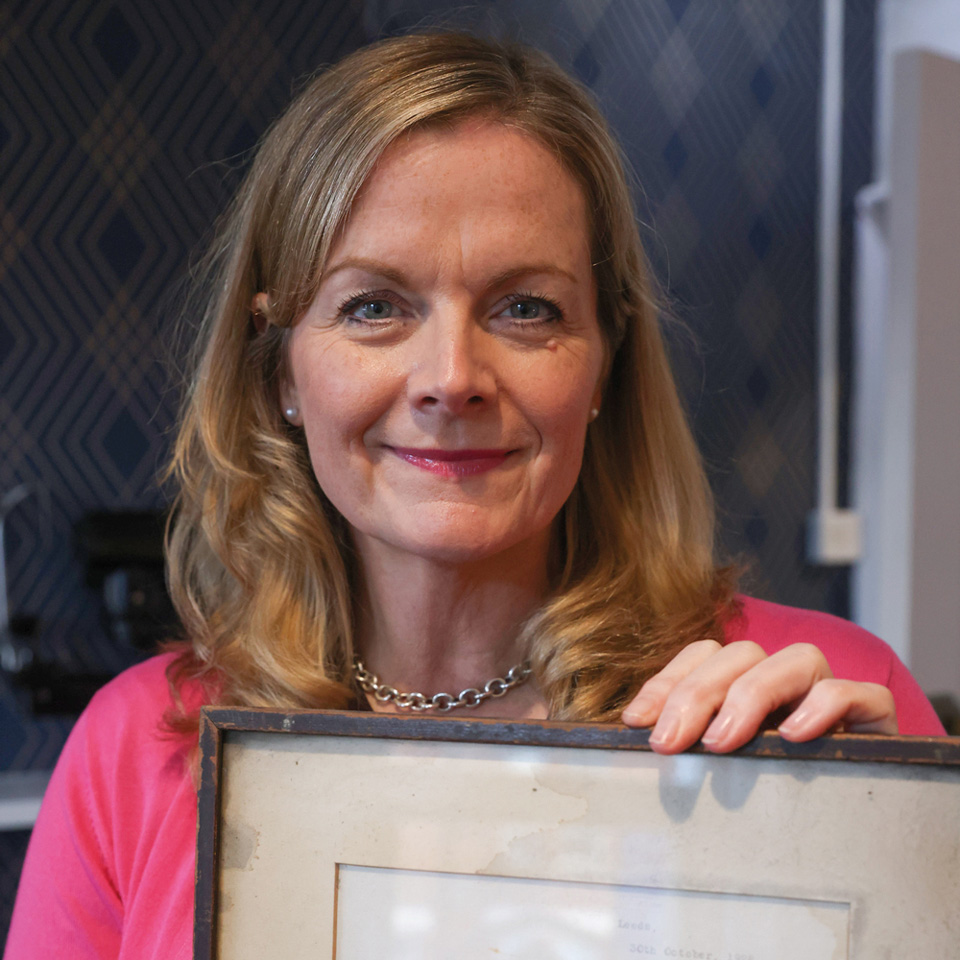
Campbell-Walker is now an optometry senior specialist lead for NHS Education for Scotland. She is currently working on a project that explores how virtual reality could be used to address the shortage of independent prescribing placements.
During the simulation-based IP placements, optometrists interact with ‘simulated patients,’ who are professional actors, and examine ophthalmic conditions using the EyeSi virtual reality slit lamp.
In her role as an AOP Councillor, Campbell-Walker hopes to be able to influence some of the broader discussions that are happening within the profession.
“This is a time where optometry is at a crossroads. If you want things to go in a different direction, if you want to know what's happening, you need to be on the inside,” she emphasised.
“My career is a chocolate box of roles,” Campbell-Walker added.
“Because I’m doing different things, it keeps me fresh,” she said.
When Ghislaine Dunn started her IP course, she had just purchased her first optometry practice, which she rebranded and renovated in the first four months. Her two boys were aged five and six months.
“I had a lot of hats on that year. I’m not quite sure how I got through it, to be honest,” she said.
“Complete, dogged determination and lots of late nights,” Dunn shared.
Nobody is going to come and offer you a golden goose
Dunn saw the qualification as a way of preparing herself in the event that low dose atropine receives regulatory approval for myopia management in the UK. She also thought IP would streamline her role as an optometrist in the glaucoma department at Addenbrooke's Hospital.
“I wouldn’t have to keep running to the doctor to ask them to make out a prescription for me,” she shared.
Although optometry is a female-dominated profession, a 2023 member survey by the AOP found that men were at least twice as likely to aspire to manage their own business in optometry as women.
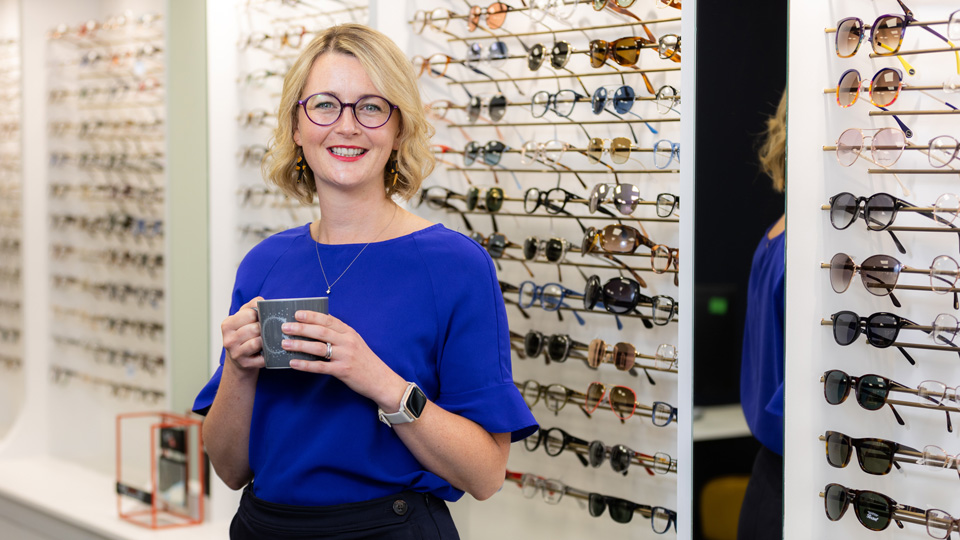
Despite the challenges associated with balancing different roles, Dunn is glad that she persevered after turning down opportunities in the past due to family commitments.
“Being a woman in your 30s can be really tough. You’ve got the demands of family and then establishing your career,” she said.
“I think as soon as I had my second child, I was like, ‘Right, I can get on with my career now.’ And I took everything on all in one go,” Dunn shared.
Through her experience working in different practices, Dunn observed how different approaches to running a business could succeed and fail.
As the owner of Peters Opticians – a Hakim Group independent practice – she aims to create a supportive environment where people enjoy coming to work.
“If you treat people well and fairly, then they will give back to the practice. Running a business doesn't mean that humanity is cast to one side,” she said.
Dunn enjoys passing on her enthusiasm for the profession to the next generation through her role as a supervisor at Anglia Ruskin University.
In terms of her advice for younger optometrists, Dunn emphasised the importance of not waiting for the right role to come along.
“I spent quite a lot of time thinking that opportunity would come to me. Sometimes you have to go out and find it. Nobody is going to come and offer you a golden goose,” she said.
Dunn, who in a past life sat quietly at the back of lecture theatres, afraid of saying the wrong thing, is now the one at the front asking questions.
“Don't be afraid of your own voice,” she said.
She recently took up an opportunity to speak as a health expert on BBC Radio Cambridgeshire.
“That was out of my comfort zone. But again, this is the me saying yes to everything. And actually, it was really good fun.”
Advertisement


Comments (0)
You must be logged in to join the discussion. Log in